CLAS 353
November 14, 2024
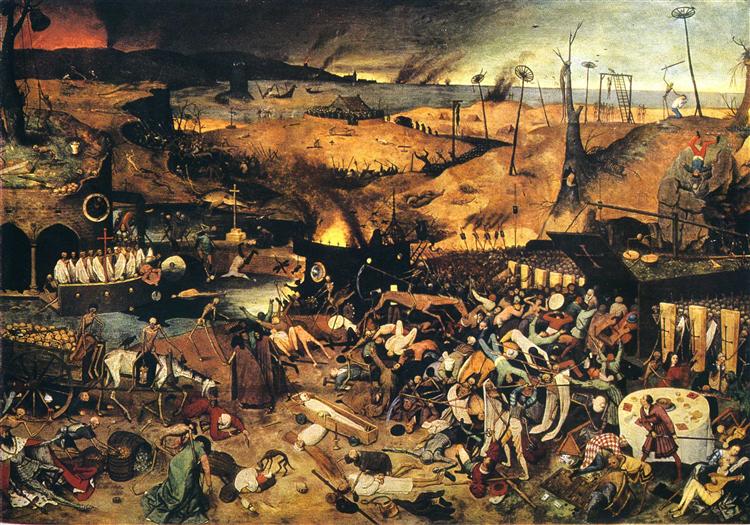
Pieter Bruegel, The Triumph of Death (1563)
Examination #2 Key
Lucretius, On the Nature of Things 4: materiality of sight, perception, thoughts & images > sleep & dreams (day's material images linger, 4.907ff.) > love/sex (related topics, e.g. procreation/heredity/fertility)
- images = simulacra of beloved penetrate lover's mind, cause desire & insatiable longing = pain > romantic love not an Epicurean pleasure
GROUPS
- permissible/safe love in Lucretius's strange misogynistic account?
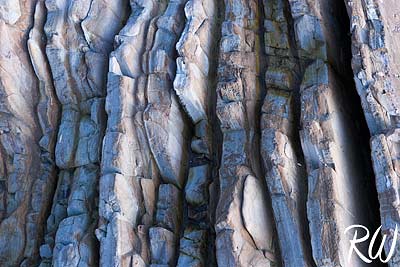
On the Nature of Things 4.1278-87 (love & erosion)
Sometimes neither by divine agency nor by the shafts of Venus
it happens that a woman of lesser worth and beauty is loved.
For sometimes a woman herself by her very own actions
and compliant ways and neatly groomed body makes it
so that she easily accustoms you to spend your life with her.
What is more, close familiarity brings love into existence.
For however lightly anything is struck by frequent blows,
it is yet overcome in a long period of time and yields.
Don’t you also see that drops of liquid falling
on rocks bore through the rocks in a long period of time?
- On the Nature of Things 5: temporary & material nature of physical world (celestial bodies, i.e. sun, moon, etc.); non-religious/mythic views of world formation & human development = Lucretius’s anthropology (5.772ff.)
- opening: Epicurus worthy of quasi-divine status for "heroic"
gift of ataraxia?
On the Nature of Things 5.7ff. (humankind's greatest benefactor?)
For if we must speak as the majesty of things now
known to us demands, he was a god, a god, illustrious Memmius,
who was the first one to discover this system of life which
now is called wisdom and who by his scientific method
rescued life from such waves and from such darkness
and situated it in such calm waters and such clear light.
For compare the ancient godlike discoveries of others . . . [Ceres, Liber]
. . . But it was not possible to live well without an untroubled mind,
so that more deservedly he seems to be a god to us,
from whom even now sweet comforts for life
are spread throughout great peoples and soothe their spirits.

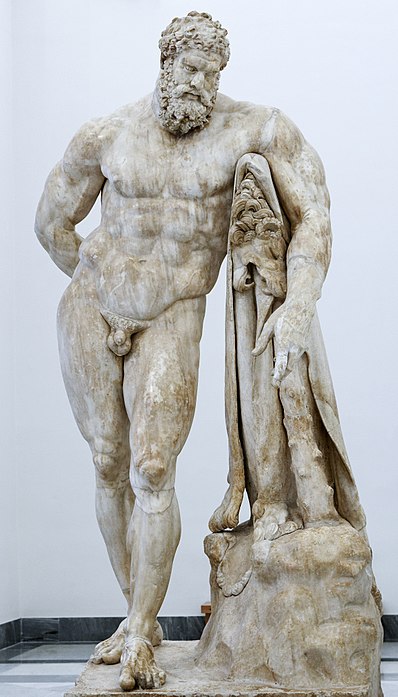
L: bust of Epicurus (1st-2nd century CE); R: Farnese Hercules (3rd century CE)
- redefining epic heroism: comparison of Epicurus's (philosophical/psychological) battle & Hercules's slaying of monsters, "How many sharp cares of desire carve up / a human being in distress, and equally how many fears . . . he who subdued all these things / and drove them from the mind with words, not arms—isn't it fitting / that this human be deemed worthy of being numbered among the gods?" (5.45ff.)
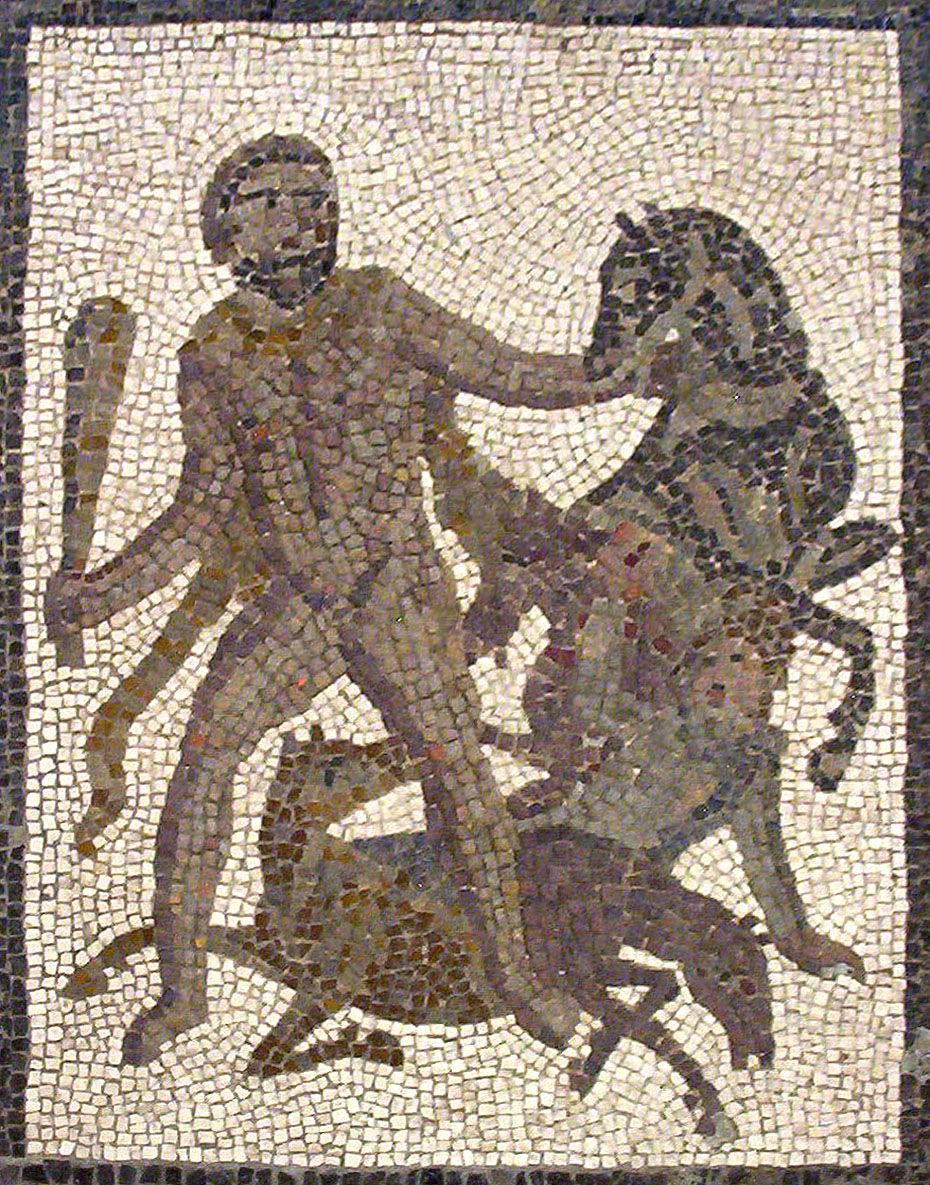
Hercules battles the Horses of Diomedes (Spain, 3rd century CE)
- nature of gods: no part in our world; human world not created by gods for us (non-anthropocentric view of humankind); flawed & mortal world not created by divinity (5.195ff.)
On the Nature of Things 5.146ff. (distanced gods; Lucretius's unfulfilled promise)
This likewise is not possible for you to believe:
that the holy dwellings of the gods are in any part of our world.
For the nature of the gods, rarefied and far removed from our senses,
is seen with great difficulty by the intellectual faculty of the mind.
And since it has always escaped the touch
and stroke of the hands,
it ought not to touch anything which is able to be touched by us.
For what is not itself permitted to be touched is not able to touch.
Therefore too their dwelling places ought to be different
from our dwelling places, being rarefied in accordance with their bodies.
I will prove these things to you later in a long discourse.
To say further that for the sake of human beings the gods
wished to prepare the brilliant nature of the world and therefore
it is fitting to praise it as the praiseworthy work of the gods
and to think that it will be eternal and not perish . . .
. . . is to lack all reason.
- Lucretius's speculative account of human origins & evolution ("our age is unable to determine what happened / before, except if reason somehow reveals traces", 5. 1446-7):
–
plants followed by animals (moisture/heat)
–
trial & error for functional human form
–
early humans foragers living in caves & forests without laws or society
–
increased human cooperation, humans develop language (as other animals), discovery of fire & cooking
–
kings, cities, laws; technology – metallurgy, tools & weapons, war & use of animals in warfare (?)
–
agriculture, weaving, civilizing arts & more recent skills, e.g. shipbuilding, "poets began to hand down mighty deeds / in songs"; "these were gradually revealed by practice along with the inventiveness / of a quick mind to humans progressing step-by-step" (5.1444ff.)
- language's development (5.1028-90): evolutionary process (gestures, sounds, language); argumentative support from non-human animals, "to think that one individual then distributed names / to things and that humans learned the first words from him / is absurd" (5.1041-3); language & naming things > Epicurean concept of prolepsis ("preconception", i.e. ability of humans to form general concepts from particular sensory data, experiences, etc.)
On the Nature of Things 5.1087-90 (comparison with non-human animals)
Therefore, if various feelings cause living creatures.
although they are mute, to let out various calls,
how much more reasonable is it that humans
can indicate different things with one sound or another.
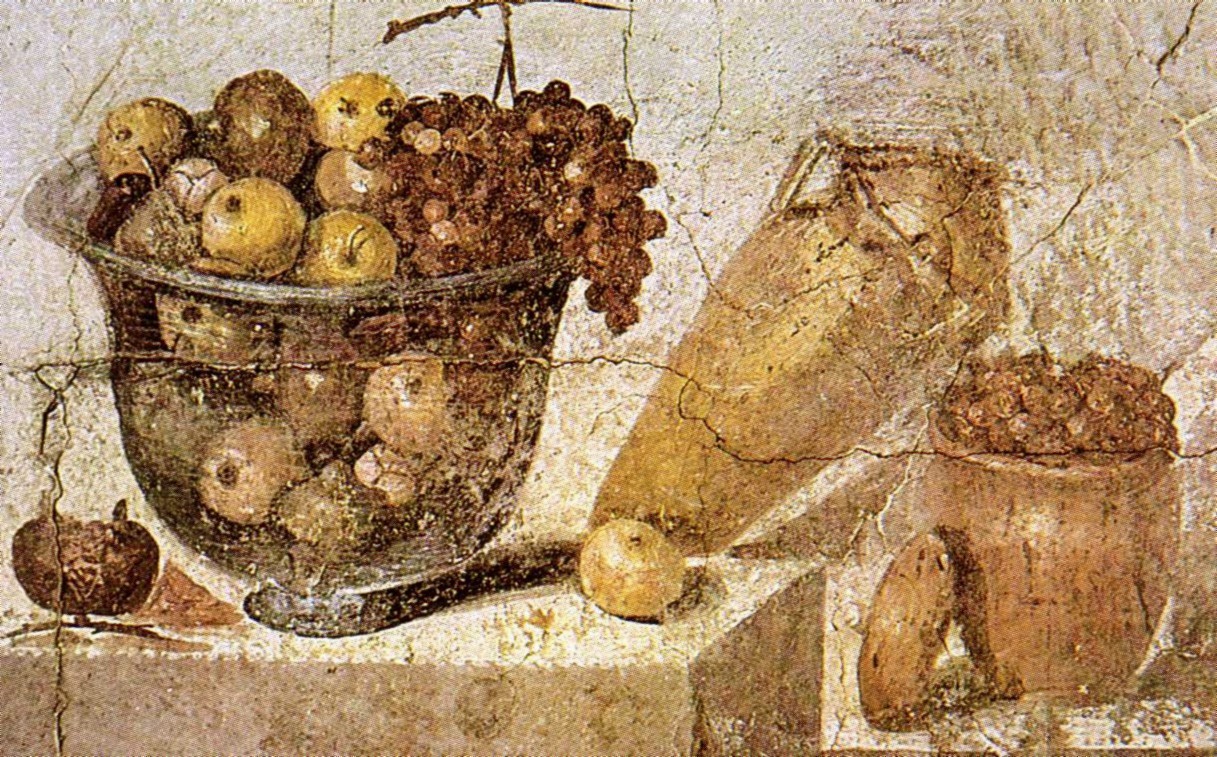
Still life fresco (House of Julia Felix, Pompeii, 1st century CE)
- origin of religion: human fear of images of gods (epiphanies, visions, dreams) + ignorance of natural phenomena
On the Nature of Things 5.1194-1203 (apostrophe to the religious; radical redefinition of pietas)
O unhappy human race, to have attributed
such activities and assigned fierce anger to the gods!
What groans did they then beget for themselves, what
great harm for us, what tears for our descendants!
Piety is not
to be seen often with the head covered
turning towards a stone and
approaching every altar,
nor to lie prostrate on the ground with open palms
before the shrines of the gods, nor to sprinkle altars
with a profusion of the blood of beasts, not to join vow to vow.
It is rather to be able to look upon everything with a tranquil mind.
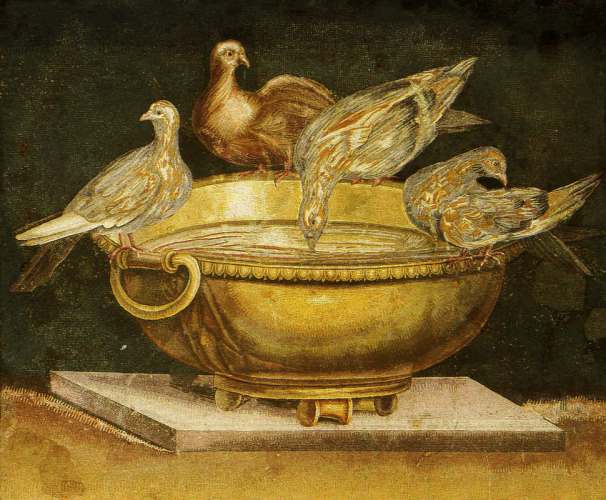
Doves mosaic (Villa of Hadrian, 2nd century CE)
- invention of song & music (birds, wind blowing through stalks) > nature creates model Epicurean pleasure
On the Nature of Things 5.1390-1404 (music & pure Epicurean pleasure)
These songs soothed their minds and gave delight
when they had eaten sufficiently: for then all things are pleasing.
And so often, reclining
beside one another in the soft grass
beside a stream of water beneath the branches of a tall tree,
and at not great expense they delightfully cared for their bodies,
especially when the weather smiled down and the seasons of the year
painted colorful flowers on the green-growing grass.
Then joking around, then conversation, then sweet laughter often
occurred. For then the sylvan muse was alive and thriving,
then pleasing playfullness taught them to encircle their heads
and shoulders with festive crowns woven from leaves and flowers,
and to step forward without rhythm, moving their limbs
clumsily and with clumsy foot pounding mother earth.
From these smiles and sweet laughter arose, since all
these things then thrived, new and wondrous.
- On the Nature of Things 6: more praise of Epicurus ("He set out what the highest good is . . . and showed the way by which, on a little / footpath, we might struggle towards it", 6.26ff.)); weather phenomena (e.g. thunder and lightning), terrestrial events (e.g. earthquakes, volcanoes) > disease & pestilence (natural phenomena – airborne seeds) > devasting plague at Athens (430 BCE)
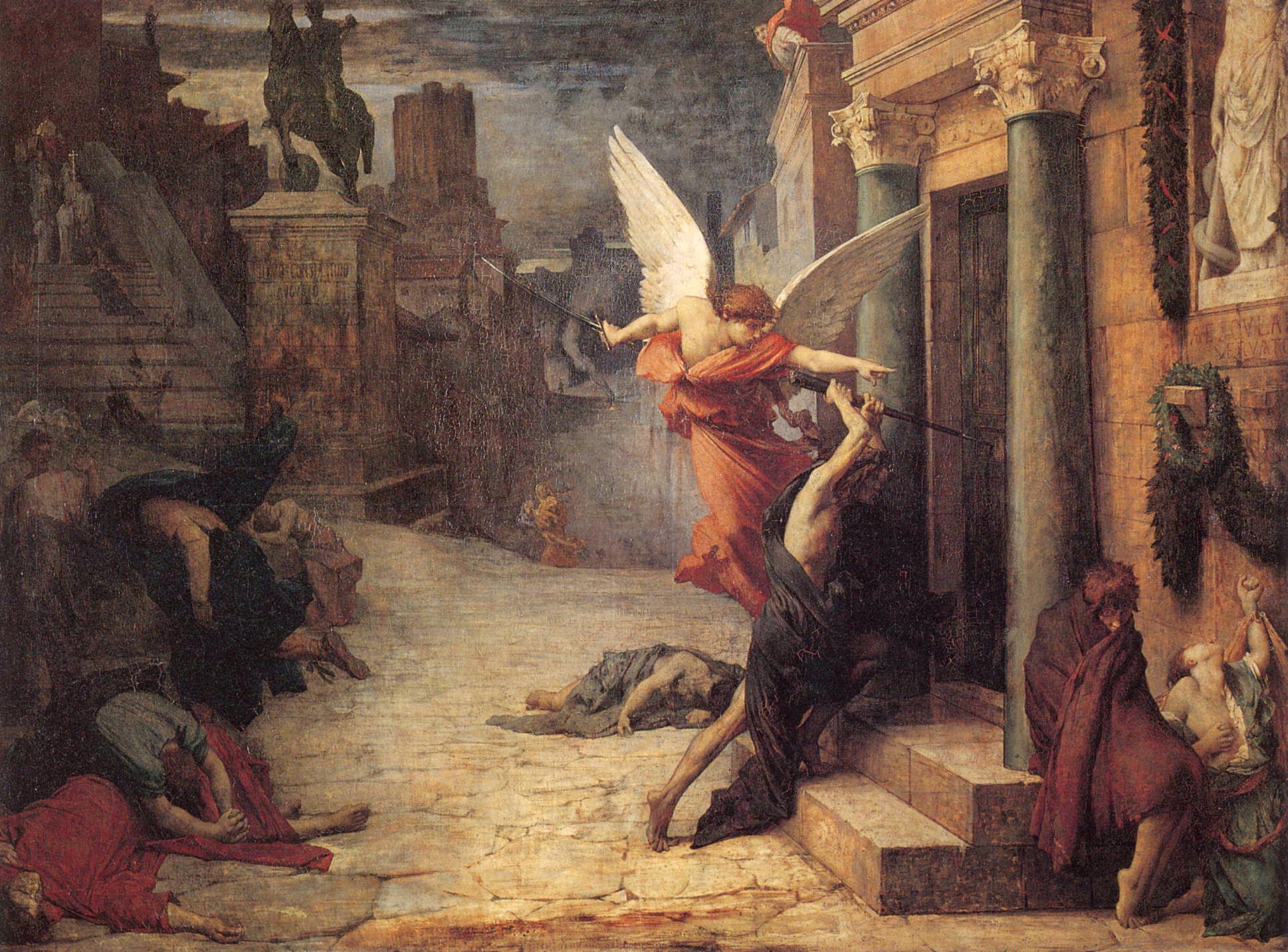
Delaunay, The Plague in Rome (1869)
- human responses to the plague
On the Nature of Things 6.1205-12 (effects of fear of death)
Further, for the one who escaped the fierce discharge of foul
blood, the disease still travelled into the sinews
and limbs, and even into the genital parts of the body.
And some, fearing with great severity the threshold of death,
continued to live once their manly parts were cut off
by the knife, and others yet remained in life without benefit
of hands or feet, and some suffered the loss of their eyes:
so far had the piercing fear of death come over them.
On the Nature of Things 6.1237-45 (the heroic: community & compassion in death)
For whoever avoided going and seeing their own sick
excessively greedy for life and being afraid of death.
was punished soon after by slaughtering neglect
with a foul and evil death, abandoned and without aid.
But those who stayed around to help died from contagion
and the labor that shame forced them to undergo,
and the coaxing voice of the sick mixed with the voice of lamentation.
The most virtuous people underwent this type of death.
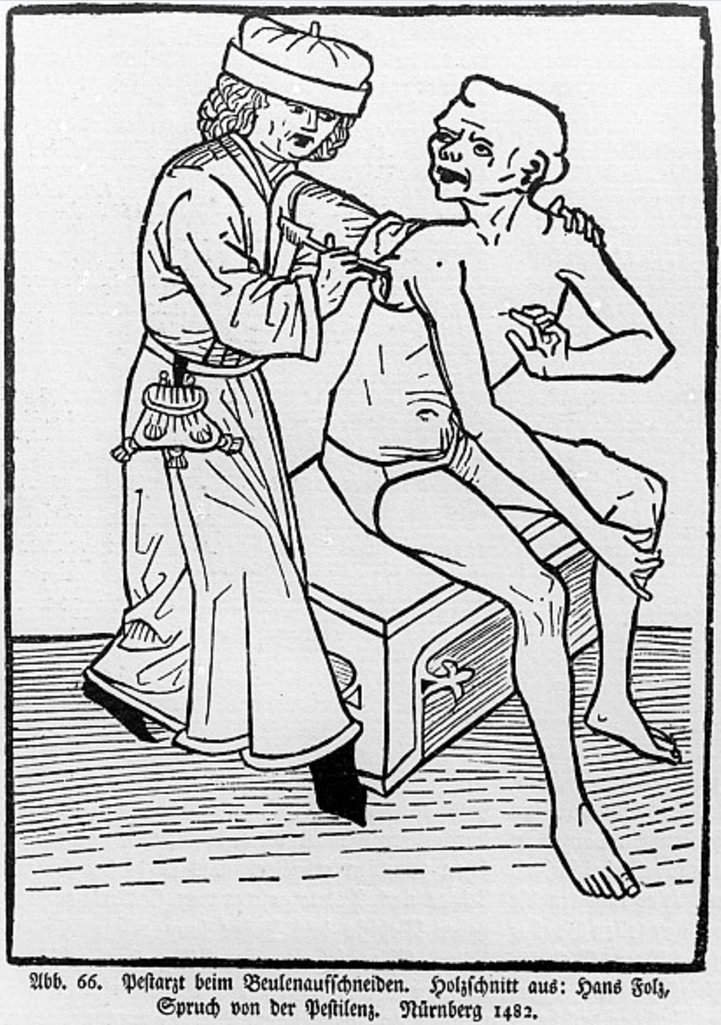
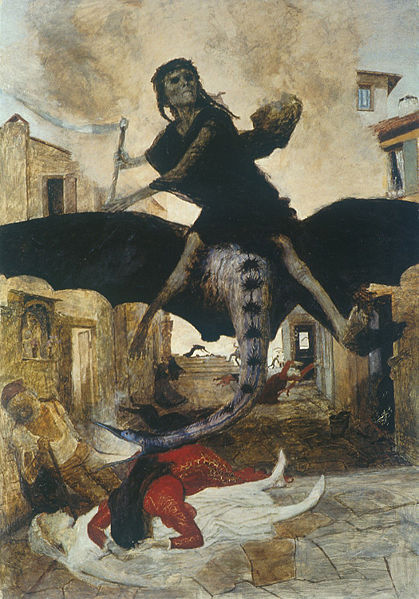
L: Woodcutting of a bubo being lanced (15th century); R: Arnold Böcklin, Plague (1898)
- plague as ultimate test of beliefs
On the Nature of Things 3.55-8
Wherefore it is more effective to gauge a person in times
of doubt and danger, and to learn what they are like in adversity.
For then at last real voices are extracted from the bottom
of the heart and the mask is ripped off: reality remains.
- collapse of civil society & community
On the Nature of Things 6.1272-86 (poem's final grim images of fear & anxiety)
At last death filled up all the holy shrines
of the gods with lifeless bodies, and everywhere all
the temples of the heavenly ones remained burdened with corpses,
which places the temple-guardians had packed with guests.
Nor indeed any longer was reverence of the gods or their divinity
of much worth: the present grief was completely overwhelming.
Nor did those burial rites continue in the city, with which
these people before were always traditionally buried.
For the whole populace was perturbed and in a panic, and each one,
grieving, buried his own dead hastily, as time allowed.
The suddenness of events and poverty led to so many horrible actions.
For they placed their own blood-relatives with tremendous wailing
on top of funeral pyres heaped high for others
and set torches beneath them, often violently quarreling
with great bloodshed rather than desert the bodies.









